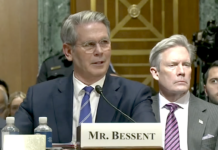
(GA Recorder) — Legislators in Georgia overwhelmingly approved legislation Monday that would change the way electric vehicle owners pay to recharge their cars and trucks to a similar system.
Senate Bill 146, which establishes guidelines to regulate and tax electric vehicle charging stations in a similar way as retail fuel pumps, was passed by the Senate and House with nearly unanimous support.
The second part of the bill refers to the permitting, inspections, and regulations of charging stations to be enforced by the Department of Agriculture.
If Gov. Brian Kemp signs off on the plan, the bill would allow convenience stores and other businesses to charge the electricity by the kilowatt hour instead of the amount of time it takes for electric vehicle drivers to charge their batteries.
However, supporters of Georgia’s quest to become a leader in the EV market complain the legislation heaps additional taxes on top of the $217 annual registration fee paid by owners of electric vehicles to help pay for road and bridge maintenance.
Several lawmakers objected to the measure, saying it will force an unreasonable tax on drivers who use free public charging stations. And, they say, companies that might offer the service as a benefit to their environmentally friendly employees also would bear an unfair cost. According to the legislation, electric charging at business and public places will be taxed at a rate that corresponds to the price of gas per gallon.
Atlanta Democratic Sen. Jason Esteves said he appreciated the hard work lawmakers performed to get a grasp on the electric vehicle industry. But he underscored the importance of not making Georgia one of the most expensive places to own and drive EVs in the nation.
If the pending legislation becomes law, Georgia will become the fifth state to implement a kilowatt-hour fee.
“The intent to target out-of-state drivers driving to Georgia makes perfect sense, but it would also impact residents who live here and who are helping to make Georgia the EV capital of the country,” Esteves said.
A months-long joint legislative study committee led to this year’s electric vehicle legislation in the Senate, and a similar House bill as the state prepares to receive a $135 million federal grant to install charging stations off interstate exits in rural communities. The study panel last year heard recommendations from utility executives, state regulators, convenience store owners, and electric vehicle drivers on the best way to regulate a market that now accounts for just 1% of vehicles on the road but could grow to 10% by 2030.
The Republican sponsors of the twin proposals pointed out that the state should be better able to determine whether the annual EV registration fee is the best method for maintaining roads and bridges by the time the new law goes into effect in 2025.
As part of a multistate pilot program, the state is evaluating the feasibility of replacing the fee with a system based on the number of miles driven.
The new rules also ensure the safety of the equipment and the reliability that people are being charged appropriately, Senate Majority Leader Steve Gooch said.
“As time goes on and inflation rises, the dollar value of $1 will continue to decrease,” said Gooch, who sponsored the Senate bill. “So if the gasoline tax goes up to 35 cents per gallon, then that rate would also go up with the electric cars.
“What we’re trying to do is to make sure that the (person) driving a gasoline-powered car is paying the same rate as the person that is driving an electric car,” Gooch said.







